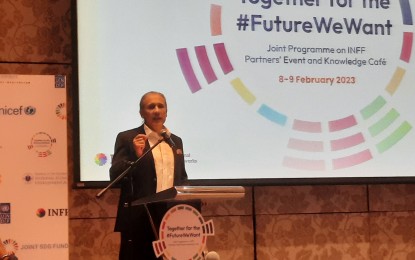
BUDGET TAGGING. United Nations Philippines Resident Representative Gustavo Gonzales delivers his welcome remarks during the Joint Program on Integrated National Financing Framework's (JP-INFF) Partners’ Event and Knowledge Café at the Marco Polo Hotel in Ortigas Center, Pasig City on Wednesday (Feb. 8, 2023). The JP-INFF promotes budget tagging of Sustainable Development Goals-related initiatives to monitor the country's investments in achieving the SDG targets. (PNA photo by Kris Crismundo)
MANILA – Public and private sectors are encouraged to implement budget tagging on their initiatives related to Sustainable Development Goals (SDGs) to monitor the country's investments in achieving the SDG targets.
During the Partners’ Event and Knowledge Café of the Joint Program on Integrated National Financing Framework (JP-INFF) in Pasig City on Wednesday, United Nations Philippines Resident Representative Gustavo Gonzales said it is imperative to integrate SDGs into national planning and budget processes and the private sector’s business model.
Budget tagging aims to promote the prioritization of SDG-related programs, activities, or projects in planning, investment programming, and budgeting in national government agencies, local government units, and the private sector.
Gonzales said reporting and monitoring the public and private sectors’ financing in SDGs would help track and evaluate current spending on achieving these targets. It will also help in identifying SDGs with the least and most investments to guide future expenditure on these initiatives.
He said that based on the report of the Economic and Social Commission for Asia and the Pacific (ESCAP), achieving the SDGs would reach by 2065 at current trends thus, the need to boost spending on SDG-related initiatives.
“If we continue these trends, if we leave things continue as they are now, we will reach the SDGs by 2065. So, we are under huge pressure,” he added.
Gonzales said the coronavirus disease 2019 (Covid-19) has also made it more challenging to achieve the SDGs by 2030.
“The Organization of Economic Cooperation and Development, or OECD, estimated that there is around USD3.7 trillion as a funding gap between the actual financing needs to meet the SDGs by 2030 and of course, what is provided by current investment level, with Covid-19 pandemic created additional capital needs,” he said.
The INFF is in operation in 86 countries, including the Philippines, and aims to unlock a wide range of available financing resources to accelerate the achievement of SDGs.
The JP-INFF in the Philippines focuses on five SDGs – (3) Good Health and Well-Being, (4) Quality Education, (5) Gender Equality, (8) Decent Work and Economic Growth, and (17) Partnership for the Goals. (PNA)
